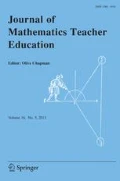REFERENCES
Allee, V. (2000). Knowledge networks and communities of practice. OD Practitioner, Journal of the Organization Development Network, 32(4), 4-13.
Altrichter, H., Posch, P. & Somekh, B. (1993). Teachers investigate their work. An introduction to the methods of action research.London, New York: Routledge.
Bammé, A. (2002).Auf dem Wege zur Interventionswissenschaft. Unpublished paper. Klagenfurt: IFF.
Birchak, B., Connor, C., Crawford, K.M., Kahn, L.H., Kaser, S., Turner, S. & Short, K.G. (1998). Teacher study groups: Building community through dialogue and reflection.Urbana, IL: National Council of Teachers of English.
Bohl, J. & Van Zoest, L. (2002). Learning through identity: a new unit of analysis for studying teacher development. In A. Cockburn & E. Nardi (Eds.), Proceedings of the 26th Annual Conference of PME, Vol. 2 (pp. 137-144). Norwich: University of East Anglia.
Brousseau, G. (1997). Theory of didactical situations in mathematics(French original translated and edited by N. Balacheff, M. Cooper, R. Sutherland & V. Warfield). Dordrecht: Kluwer.
Cobb, P. & Bauersfeld, H. (1995). The emergence of mathematical meaning: Interaction in classroom cultures. Hillsdale, NJ: Lawrence Erlbaum.
Cooney, T. (1994).Research and teacher education: In search of common ground. Journal for Research in Mathematics Education, 25, 608-636.
Ernest, P. (Ed.) (1994). Mathematics, education and philosophy: An international perspective.London: Falmer Press.
Graven, M. (2002). Mathematics teacher learning, communities of practice and the centrality of confidence.Doctoral Dissertation. Faculty of Science, University of the Witwatersrand, South Africa.
Hammerman, J.K. (1997). Leadership in collaborative teacher inquiry groups. Paper presented at the Annual Meeting of the American Educational Research Association(Chicago, IL, March 24-28, 1997). (ERIC Document No. ED408249).
Heintel, P. (2002). Interventionsforschung (der Paradigmenwechsel der angewandten Sozialforschung). Unpublished paper. Klagenfurt: IFF.
Jaworski, B. (1994). Investigating mathematics teaching. A constructivist enquiry. London: Falmer Press.
Krainer, K.: Teachers' growth is more than the growth of individual teachers: The case of Gisela. In: F.L. Lin & T. Cooney (Eds.) (2001). Making sense of teacher education(pp. 271-293). Dordrecht, Boston, London: Kluwer.
Krainer, K. (2002).Ausgangspunkt und Grundidee von IMST2. Reflexion und Vernetzung als Impulse zur Förderung von Innovationen. In K. Krainer, W. Dörfler, H. Jungwirth, H. Kühnelt, F. Rauch & T. Stern (Eds.), Lernen im Aufbruch: Mathematik und Naturwissenschaften. Pilotprojekt IMST2(pp. 21-57). Innsbruck, Wien, München, Bozen: Studienverlag.
Krainer, K. & Goffree, F. (1999). Investigations into teacher education: Trends, future research, and collaboration. In K. Krainer, F. Goffree & P. Berger (Eds.), European research in mathematics education I.III. On research in mathematics teacher education(pp. 223-242). Osnabrück: Forschungsinstitut für Mathematikdidaktik.
Lave, J. & Wenger, E. (1991). Situated learning: Legitimate peripheral participation. New York: Cambridge University Press.
Little, J.W. (1982). Norms of collegiality and experimentation: Workplace conditions of school success. American Education Research Journal, 19(3), 325-340.
Noddings, N. (1996). On community. Educational theory, 46(3), 245-266.
Peter-Koop, A., Begg, A., Breen, C. & Santos-Wagner, V. (Eds.) (2003). Collaboration in teacher education. Examples from the context of mathematics education. Dordrecht: Kluwer.
Reynolds, D., Creemers, B., Stringfield, S., Teddlie, C. & Schaffer, G. (Eds.) (2002). World class schools. International perspectives on school effectiveness. London, New York: Routledge Falmer.
Senge, P. (1990). The fifth discipline: The art and practice of the learning organization.New York: Currency Doubleday.
Vygotsky, L. (1978). Mind in society. Cambridge, MA: Harvard University Press.
Wenger, E. (1998). Communities of practice: Learning, meaning, and identity.New York: Cambridge University Press.
Wenger, E., McDermott, R. & Snyder, W. (2002). Cultivating communities of practice: A guide to managing knowledge. Cambridge, MA: Harvard Business School Press.
Willke, H. (1999). Systemtheorie II: Interventionstheorie(3rd ed.). Stuttgart: Lucius & Lucius UTB.
Rights and permissions
About this article
Cite this article
Krainer, K. Teams, Communities & Networks. Journal of Mathematics Teacher Education 6, 93–105 (2003). https://doi.org/10.1023/A:1023918616310
Issue Date:
DOI: https://doi.org/10.1023/A:1023918616310

